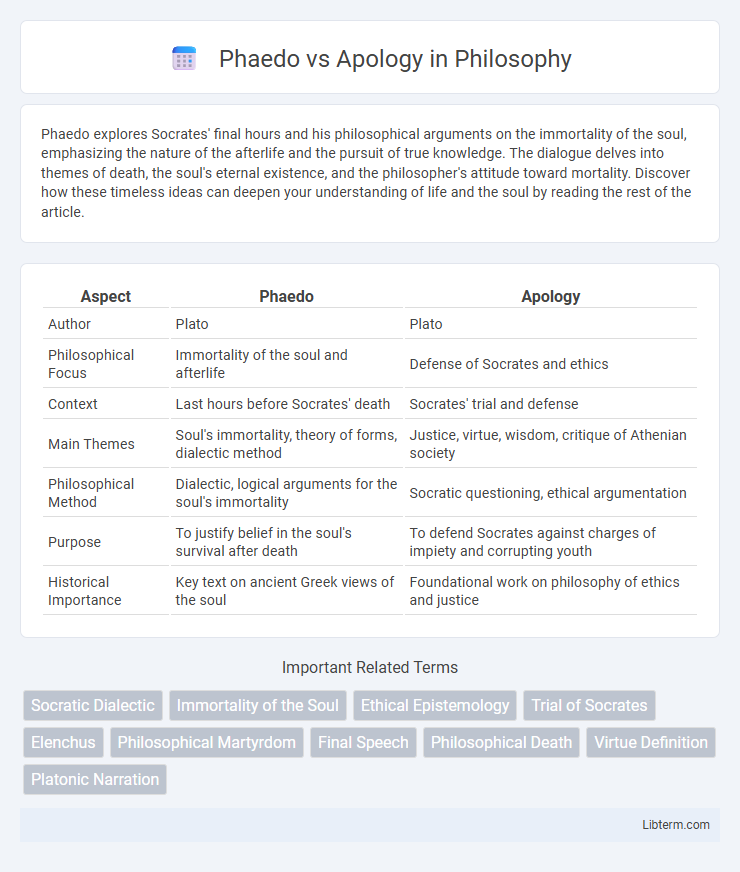Phaedo explores Socrates' final hours and his philosophical arguments on the immortality of the soul, emphasizing the nature of the afterlife and the pursuit of true knowledge. The dialogue delves into themes of death, the soul's eternal existence, and the philosopher's attitude toward mortality. Discover how these timeless ideas can deepen your understanding of life and the soul by reading the rest of the article.
Table of Comparison
| Aspect | Phaedo | Apology |
|---|---|---|
| Author | Plato | Plato |
| Philosophical Focus | Immortality of the soul and afterlife | Defense of Socrates and ethics |
| Context | Last hours before Socrates' death | Socrates' trial and defense |
| Main Themes | Soul's immortality, theory of forms, dialectic method | Justice, virtue, wisdom, critique of Athenian society |
| Philosophical Method | Dialectic, logical arguments for the soul's immortality | Socratic questioning, ethical argumentation |
| Purpose | To justify belief in the soul's survival after death | To defend Socrates against charges of impiety and corrupting youth |
| Historical Importance | Key text on ancient Greek views of the soul | Foundational work on philosophy of ethics and justice |
Introduction: Comparing Phaedo and Apology
Phaedo and Apology are two essential Platonic dialogues that explore Socratic philosophy and his final moments. Phaedo centers on Socrates' reflections on the soul and the afterlife during his last hours, providing profound metaphysical insights. Apology presents Socrates' defense speech at his trial, highlighting his ethical principles and commitment to truth.
Philosophical Context of Phaedo and Apology
Phaedo explores Socratic themes of the soul's immortality and the philosophy of the afterlife, emphasizing metaphysical discussions on the eternal nature of the soul and the pursuit of true knowledge. Apology centers on Socrates' defense against charges of corrupting youth and impiety, highlighting his commitment to ethical inquiry and the examined life as a path to virtue. Both dialogues reflect the foundational principles of Socratic philosophy but approach metaphysics and ethics from distinct contextual perspectives.
Socratic Dialogue Structure in Both Works
Phaedo and Apology both exemplify Socratic dialogue structure through a series of probing questions and answers that explore profound philosophical themes. In Phaedo, the dialogue centers on the immortality of the soul, featuring Socrates engaging his followers in logical reasoning before his death, while Apology showcases Socrates defending his life and philosophy through dialectical exchanges in a legal setting. Both texts highlight Socratic elenchus, the method of refutation, and emphasize ethical inquiry, but Phaedo adopts a more metaphysical focus compared to the juridical and ethical emphasis in Apology.
Central Themes: Death and the Afterlife
Phaedo explores the soul's immortality and the philosopher's serene acceptance of death as a transition to an afterlife, emphasizing the soul's purification and eternal existence. Apology centers on Socrates' fearless stance toward death, framing it as either a peaceful nothingness or a chance to converse with other deceased souls, highlighting wisdom and virtue over fear. Both dialogues intertwine death with the pursuit of truth and virtue, showcasing differing yet complementary views on the soul's fate beyond mortal life.
Socrates’ Defense: Contrasts in Tone and Purpose
Socrates' defense in Apology exhibits a confident and assertive tone, emphasizing rational argumentation to justify his philosophical mission and confront accusations of impiety and corruption. In contrast, Phaedo presents a more reflective and somber tone as Socrates prepares for death, focusing on the immortality of the soul and the pursuit of true wisdom. These differences highlight Apology's purpose of legal defense against charges, while Phaedo serves to illustrate Socratic philosophy on life, death, and the soul's eternal nature.
The Nature of the Soul: Phaedo's Metaphysical Insights
Phaedo presents the soul as an immortal and immaterial entity, distinct from the body and capable of existing independently, emphasizing its eternal nature and purification through philosophy. In contrast, Apology focuses more on the soul's moral responsibility and intellectual pursuit during life, portraying it as essential for justice and truth. Plato's metaphysical insights in Phaedo deepen the understanding of the soul's transcendence beyond physical death, highlighting its preexistence and posthumous journey.
Apology’s Perspective on Virtue and Wisdom
In Apology, Socrates asserts that true wisdom lies in recognizing one's own ignorance, emphasizing intellectual humility as the foundation of virtue. He argues that virtuous living stems from the pursuit of knowledge and self-examination, which aligns moral integrity with philosophical inquiry. This perspective contrasts with Phaedo's focus on the soul's immortality, highlighting Apology's prioritization of ethical wisdom through continuous questioning.
Concept of Justice in Phaedo vs Apology
In Plato's *Phaedo*, the concept of justice centers on the soul's purity and the pursuit of philosophical wisdom as a means to achieve true justice beyond bodily existence. In contrast, *Apology* emphasizes justice as Socrates' unwavering commitment to truth and moral integrity within society, defending his righteous conduct against corrupt accusations. Both dialogues present justice as integral to the soul's well-being but differ in framing justice through metaphysical purification versus ethical and civic responsibility.
Literary Style and Rhetorical Techniques
Phaedo employs a dramatic narrative style, combining dialogue and vivid imagery to explore themes of death and immortality, while Apology uses a straightforward, persuasive speech format to defend Socrates against accusations. Phaedo's rhetorical techniques include Socratic questioning and emotional appeals that evoke a contemplative mood, whereas Apology relies heavily on logical argumentation and irony to challenge the credibility of Socrates' accusers. Both texts showcase Plato's mastery of rhetoric, yet Phaedo emphasizes philosophical reflection, and Apology prioritizes legal self-defense.
Lasting Influence and Legacy of the Dialogues
Phaedo profoundly shaped philosophical discourse on the soul's immortality and the afterlife, influencing Neoplatonism and early Christian thought through its detailed portrayal of Socratic death and the theory of forms. Apology's enduring legacy lies in its defense of philosophy as a noble pursuit and Socrates' exemplar of intellectual integrity, inspiring the development of Western ethical and legal thought. Both dialogues continue to be foundational texts in philosophy, cementing Socrates' lasting influence on concepts of virtue, truth, and moral courage.
Phaedo Infographic

 libterm.com
libterm.com